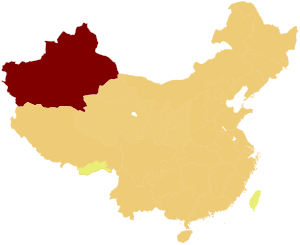New leaks show how China targeted Muslims for internment


The China Project illustration by Derek Zheng
A new leak of documents from the Chinese government provides further details of the Chinese government’s vast system of surveillance and detainment in Xinjiang. The “Karakax list” is the third major such leak of government documents.
Like the two previous leaks, to the New York Times and the International Consortium of Investigative Journalists (ICIJ), the Karakax list confirms the culturally abusive nature of policing and detention in Xinjiang, and contradicts claims by Chinese authorities that the “re-education” facilities are targeted at rooting out “separatism” or “extremism.”
The new document shows 311 case files from Karakax County in southwestern Xinjiang, where 98% of the residents identify as Uyghur, a mostly Muslim ethnic minority. The Financial Times, one of more than a dozen outlets that was shown the paper ahead of its publication today, verified its authenticity and explains what it shows us:
The purpose of the file appears to be to record judgments on whether an individual should remain in one of four camps in the county or be moved to another part of the system. In some entries, the word “agree” was written beside a judgment, suggesting the files were used by government officials to communicate and approve decisions.
The records appear to have been updated multiple times from early 2017 to early 2019. In some cases, the same people are listed repeatedly, showing a series of judgments, with the final verdict often being “graduation”…
The Karakax list’s most commonly cited reason for interning members of minority communities is violation of family planning policies — China’s strict rules governing the number of children each family can have.
Being a practicing Muslim is the second most common reason. Possession of “illegal” religious videos or books can result in imprisonment, as well as going on hajj — the pilgrimage to Mecca — wearing a veil or closing a restaurant during Ramadan.
What is the significance of the documents?
According to one source quoted in the Wall Street Journal:
Abduweli Ayup, a Norway-based Uyghur activist who has been verifying names and details in the document, said it shows that a large proportion of the people were sent for re-education for reasons like having too many children or applying for a passport, rather than for extremism.
“This document is really important because it tells us the reality,” he said. “In the document, there are only three cases related to separatism.”
For more on the Karakax list, see this Twitter thread and academic paper by scholar Adrian Zenz, or these reports:





